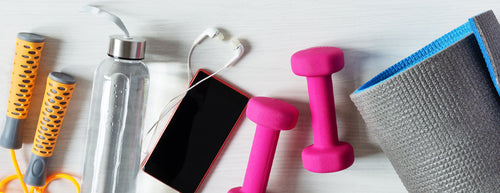Our skin is the largest organ in our body. The beauty industry is massive in part thanks to our plight for perfect skin - many of us splurge big sums of money on beauty products in our quest for more youthful skin. This is despite the old adage of beauty being ‘only skin deep’. So what does skin do and how can we protect it? Here's how to take care of your skin.
What does skin do?
At the most basic level it covers our body, holding it all together and creating a natural barrier to protect the muscles, bones and internal organs below.
Our skin is only millimetres thick, with a layer of fat underneath and a strong blood supply. It is an ingenious material, naturally stretchy but extremely strong. Self-healing, it protects the body from the elements and repairs itself when torn.
Our skin contains sweat glands, hair follicles and immune cells depending on the location in the body. It has evolved to come in a huge variety of colour tones thanks to the differing amounts of melanin or pigment it contains - a feature of evolution adapting to the climate and sun exposure levels the different races are exposed to.
It helps us regulate our body temperature and makes vitamin D. Another benefit of skin is that it keeps water in and organisms (bacteria/viruses) and toxins out.
How is it vulnerable to damage/aging?
It is not invincible and is subject to damage particularly with sharp objects, extremes of temperature (hot or cold burns) and from radiation. Radiation - invisible waves of sunlight (UV and infrared) is what causes most of the damage and aging of our skin over time. It causes changes in the skin led by the creation of ‘free radicals’ that can alter the structure of the cells at DNA level.
At the most superficial end this leads to wrinkling or ‘cosmetic’ aging of the skin. The face and hands are often the first site to show evidence of chronic skin damage/aging. Skin can lose its natural elasticity, thin, change pigmentation and develop new lumps or spots.
Those who live in the tropics, high altitudes, are fair skinned or have long exposure through outdoor work are more at risk. Premature aging of the skin is also caused by chemicals from cigarette smoking and environmental pollutants.
Women experience accelerated aging of the skin after menopause due to the loss of oestrogen in the body. Disease, medications or an altered immune system can also lead to poor wound healing and skin changes.
How do you protect skin from the sun?
A high factor, broad spectrum sun screen is essential, especially for fair Irish skin. Application year round and every 2 hours in strong sunlight (April to October) is recommended. UV index information is available with the daily weather forecast and is useful in predicting risk.
Covering up with protective clothing, avoiding midday sun and wearing hats and sunglasses are also very important. Follow the Australian: Slip (on a T shirt), Slop (on the cream) and Slap (on a hat) routine. For more on protecting your skin from sun damage, have a read of 6 tips for staying safe in the sun.
When skin gets sick…
Like any other organ in the body, skin suffers from its own diseases. From rashes that pop in childhood to common conditions like acne that flare up in the teens, here are some skin issues you may encounter and how to take care of your skin if they do arise.
Rashes
Rashes are common and often self-limiting. They can be a useful signal of an infection in the body from common childhood viruses like chicken pox to the ‘not to be missed’ rash of meningitis.
Common Skin Conditions
Common skin conditions such as eczema, psoriasis and acne can often be easily treated with the right creams and medications from your doctor. If ignored, they can cause great discomfort and psychological distress for sufferers. Many feel they have to just ‘put up’ with skin conditions. They're unaware of the wide variety of treatments available - check out some natural remedies for common skin conditions like rosacea and eczema.
Broken Skin
Broken skin is at risk - skin and cracks and wounds should be monitored for healing and risk of infection.
Changes to Moles/Freckles
Your GP will have expert training in the recognition all sorts of skin conditions. They can then seek the further expertise of a dermatologist when needed. As many skin conditions can look similar, getting a reliable diagnosis early on can be very reassuring and lead you down the correct treatment path.
If there is any concern about a new lump or mole on the skin or a change to an existing mole/freckle, it is vital to seek a medical opinion straight away. In particular itching, bleeding or a rapid change in shape or colour (over less than 6 weeks) warrant further investigation.
Can we prevent or reverse skin aging and keep skin healthy?
The skin’s greatest enemy is UV radiation. Sunscreen and covering up is the simplest and best protection. Given the role in skin damage of ‘free radicals’, their natural combatants ‘antioxidants’ have been the focus of much scientific research both by medical experts and the cosmetics industry. At present, research is inconclusive.
However, there is ongoing interest in the consumption of foods, supplements and use of creams to slow skin aging and improve skin health. They include collagen, carotenoids, polyphenols, chlorophyll, aloe vera, vitamins B, C and E, red ginseng, squalene, and omega-3 fatty acids.
Although the role of antioxidants remains unclear, the following are simple measures that can be taken alongside sunscreen to maintain healthy skin.
- Do not smoke and where possible, avoid exposure to pollutants.
- Take plenty of exercise - active people appear younger than inactive people.
- Eat fruit and vegetables daily to provide natural antioxidants.
- Keep well hydrated and moisturise skin if dry or cracked to maintain its natural protective barrier role.
- Be vigilant for skin changes or rashes and ask for medical help when unsure
Skincare SOS!
Looking after your skin is vital. For the best results, you need a good routine using suitable products long term, staying hydrated and at times, supplements on the side. However, every now and then we have a skincare emergency and we need a pick-me-up that will work fast! Here are some tips for that skincare SOS, and some saviour product recommendations.
Dull Skin
If your skin is feeling and looking dull, or if after a few hours of wearing make-up you find it loses that polished look that it had when you applied it, the Sukin Hydrating Mist Toner is perfect! It provides an instant hydration boost, can be spritzed on bare skin or over make-up to brighten, refresh and soothe. You can keep this with you, and your skin will always have that healthy, dewy glow.
Dry Skin
If your skin is feeling really dry, a good quality face mask can be a great way to moisturise the night before an event – and don’t forget, dry skin is a skin type and can be flaky and rough. Dehydrated skin is tight and dull and better treated by drinking lots of water and applying aloe vera.
Tired Eyes
Tired eyes? As we enjoy the long summer days, it can lead into late nights and early starts leaving you with puffy eyes and dark under-eye circles. To instantly lift and rejuvenate, the Kinvara Skincare Eye Wow Eye Serum is great choice. It's formulated with a powerful blend of 12 plant extracts, including fig, green coffee, horse chestnut and wonderfully cooling cucumber.
It absorbs superfast, but leaves the under eye feeling plump, firm, and more comfortable for longer. The rollerball is perfect as it deters any pulling of the delicate periorbital skin, and it can be gently rolled along the top of the zygomatic bone, also known as the cheekbone.
Looking to go organic when it comes to your skincare? Take a look at some natural and organic beauty products you'll feel good about using.
Please note, this blog is for informational purposes only and should not replace medical advice.
It’s always best to consult your doctor before taking any new supplements, treatments or remedies if you are pregnant, breastfeeding or on medication.
Checked and updated: 5 September 2021
Are you looking for more information on how you can take care of you skin? Click here to see Trilogy Skincare's blog 'Prep Your Skin for Summer with Trilogy'.













